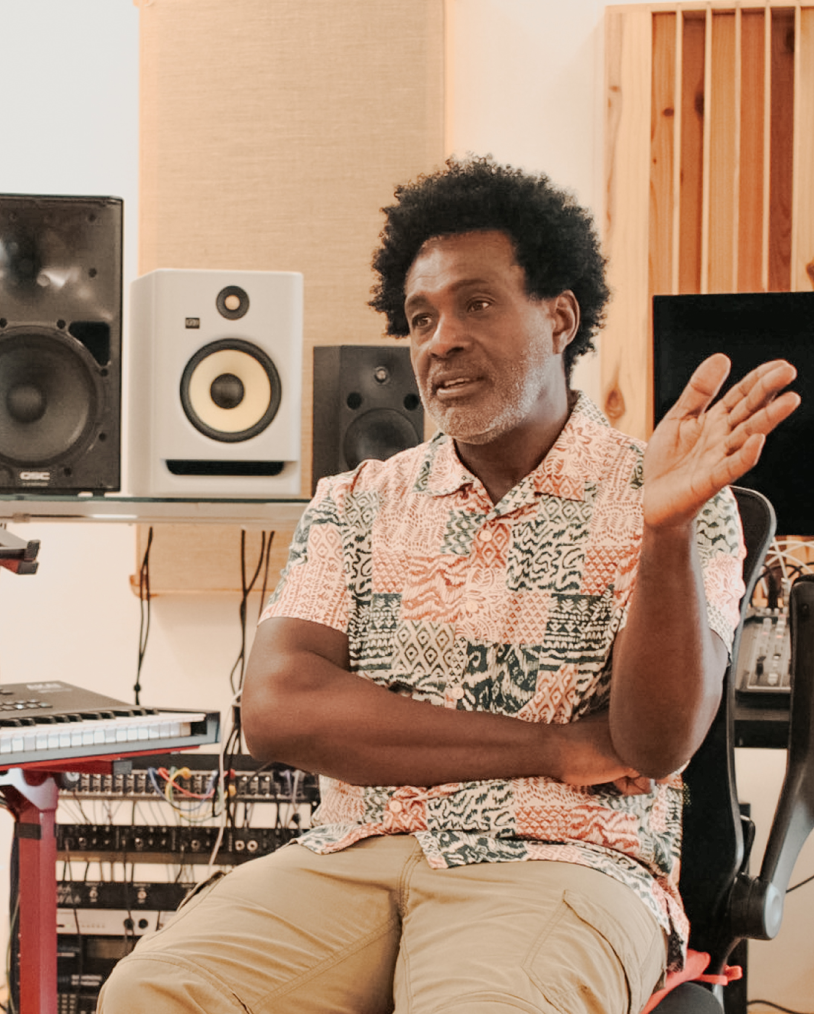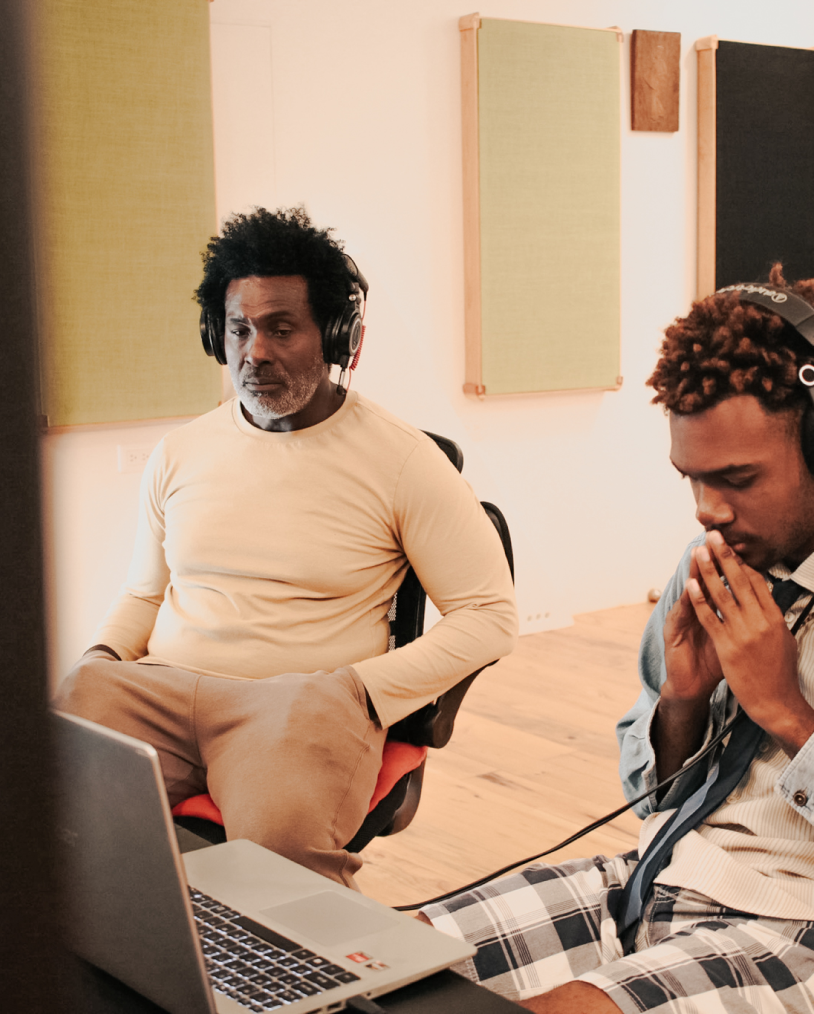
In Studio With Ken Holder
In a music studio in Tunapuna, Ken Holder sits surrounded by a legacy built in quiet brilliance.
Artisan Stories journeys into the realm of creators, where thoughts, hands, and hearts converge to alchemize abstract visions into practical creations that resonate deeply with all they touch. It offers a soulful glimpse into the various dimensions of their lives, unveiling how their craft brings healing and transcendence to their inner and outer world.
Shoroc Studio, an 18×20 sanctuary with warm wooden floors, soaring dome ceilings, and a pyramid-shaped window that floods the room with long rays of natural light, was crafted by his own hands. It embodies a quiet yet powerful philosophy grounded in purpose and built to last.
Few are aware that hundreds, perhaps even thousands, of the songs we fell in love with and music rhythms such as the pig tail album were produced by his skilled hands. Behind the rise of artiste as 3Suns, Destra Garcia, Onika Bostic (deceased), and countless others, Holder has long been the unsung architect of sound in Trinidad and Tobago.
In this candid and deeply revealing exchange, he passionately discusses the music industry, the true cost of nurturing artists, and the weight of what has been lost. His experiences and encounters along the way haven’t been in vain because, as the saying goes, “you lose to win.” Despite everything he has accomplished, he believes our ground breaking work is just ahead.

From left to right – Toofless and Ken Holder
How does it feel to be a living archive, a living museum?
I am grateful for what we have accomplished, but I am not yet satisfied.
In light of the rapid changes we are witnessing daily, reinvention is what we have been doing for our industry.
By ensuring that our musical recordings are archived, we have been preserving their true worth.
Innovation and invention are key.
You’ve worked behind the scenes for decades, shaping Trinidad and Tobago’s music. But where did it all begin for you?
I arrived in Port of Spain at a very young age. Amar Studios invited me to train and later work with them. Back then, they had an initiative called the Kiskadee Karavan, which was a significant investment in youth development. I was fortunate enough to be a part of it. However, in retrospect, I don’t believe we were fully prepared. The community wasn’t ready for such substantial investment. It’s like constructing a modern house for individuals who have just emerged from a remote environment. Our efforts were insufficient to achieve the intended outcome. More was needed holistically. This experience resonates with me, and I’m using this to bring results to fruition.


"My brother, rest in peace, was the best DJ in the country. Nobody could touch him. He’d take his turntables off the stand, put them on the floor, and transform."


From left to right – Toofless and Ken Holder

From left to right – Cozier, Ken Holder and Kezia
Can you take us back to your beginnings—before the mentorship, before Amar Studios? What was your earliest entry point into music?
My brothers used to patronized various record shops across Trinidad to buy music – vinyl records. Back then, the internet didn’t exist, and we discovered our passion for hip-hop through this media. We were part of a rap group called “Rock Krush Crew” from Five Rivers Arouca, notable key members Andy Holder aka DJ Roc Master (deceased) and Adrian Lee aka M.C. Cold Krush of Rock Krush Crew started their performances to the public from an event called Fresh Fest. These live performances culminated in “The Streets” started speaking about us from one community to another. Despite never traveling beyond Trinidad and Tobago. Our modest setup consisted of a drum machine, a keyboard and a pair of turntables, however we were the only group to introduce live instruments on stage whilst other groups were using tracks.
Every summer, a youth event called Fresh Fest by our then local promoter Calvert Constantine aka Big C sweep across Trinidad and Tobago, attracting aspiring rappers from all over the country. It was the ultimate platform for young musicians to showcase their talents. If you weren’t participating in Fresh Fest, you were considered missing out on the opportunity to make a name for yourself. We had the privilege of opening for Run DMC and Dougie Fresh when they visited Trinidad. At the time, we were all between the ages of 16 and 19, having never traveled outside our home country. However, we had a knack for building something out of nothing and creating a unique sound that resonated with audiences. Memorable musically experiences which has shaped the love for this musical culture.
What set your group apart from the rest?
I used to bring my drum machine on stage. A whole rig: drum machine, keyboard, turntables. Nobody else was doing that. Plus our Brotherhood. We’d set up like a full live band. So, when Run DMC came to Trinidad and packed out the National Stadium—guess who was on stage opening for them?
My brother Andy Holder, rest in peace, was the best DJ in the country. Nobody could touch him. He’d take his turntables off the stand, put them on the floor, and transform. I still see it in my mind’s eye like CNN. That performance changed everything.

From left to right – Adrian Lee aka Krush , Andy Holder aka DJ ROC and Ken Holder
You mentioned your brother—what role did he play in all of this?
He was the heartbeat of our group. His name was Andy Holder aka DJ Rock Master, the best DJ I’ve ever known. He transformed turntables into instruments. But he was tragically murdered when I was 20. He was 22. It broke something in us. We had to pivot—creatively, emotionally, spiritually.
I took the name Roc. I carry it still.
After that loss, you moved more into production and development. Was that a conscious shift?
Yes and no. I was always creating beats, even as a kid. But after losing Roc, I went deeper into the technical side. I started developing other people. Not just tracks—careers. Rock Krush finally got the opportunity to leave Trinidad and Tobago to go to Washington D.C. where we were hosted by Ivan Lee (deceased), record executives Mike Hughes (deceased) and Mike Kidd where we were exposed to first world business music label which opened our eyes and we got the first real taste of the international music industry. With this exposure, we began connecting the dots even more rapidly and realised what was lacking. In our hearts we know we needed to become an integral part of this larger music industry.
"I don’t know. Maybe I’m being used. Maybe it’s not even me doing it. I just knew I didn’t want other young people to face the same gaps I did. "
You’ve worked with so many artists—Machel Montano, Destra, 3Suns, General Grant, Kindred… What’s driven you to keep developing others?
I don’t know. Maybe I’m being used by GOD. Maybe it’s not even me doing it. But knowing clearly that other young people shouldn’t have to go down this long road. The 3Suns project came close to getting us to that next level. We were in negotiations with Sony, Universal, VP Records. But maybe it wasn’t meant to be!
That’s the real work. Not just making the track. Making sure the artist can sustain.
You’ve said the 3Suns project nearly broke you. Can you take us into that moment?
Shoroc Production was responsible for the entire project. That project reached real far—reached into the industry offices where we were negotiating with Sony Records, with Universal Records, with VP Records. We were in the offices with these executives, negotiating this project. But the unreadiness of them—not understanding the full process, the business. I keep telling them we’re competing with youths from different jurisdictions who are university educated, who went to Berklee College of Music. You want to be organic? Okay. But that’s not enough anymore.
3Suns was moving—no downtime. They were being booked constantly, doing plates for international DJs. Traveling on mainstream tickets. This wasn’t during the local Carnival periods – it was mainstream. We were right there. But internally? It collapsed. That project… that one hit me the worst. That one hit me the hardest. It almost bankrupted me. I had to take a break after that. Because it’s a family business, and it almost damaged me mentally. I had to step away. I had to recalibrate everything.




From left to right – Cozier and Ken Holder
What were the consequences of the collapse—for you, personally?
It almost didn’t happen for me again. After everything I built. I never begged for a job in my life. Never asked anyone in this industry to hire me. And when 3Suns collapsed, I had to look at my family and say, “Can we stick this out?” Rachel said yes. So, we did. That’s when we started building the new studio—by hand. That was my healing. That was my resurrection.
What made you start again?
COVID was a turning point. I was grieving another brother who passed. I spent time building—literally physically building—this new studio space. It was my rehabilitation. My healing. The wooden floor was done by my two brethren’s and I. And with this, something else was rebuilt inside me.

What was Rachel’s role in getting through that time?
She’s the reason any of this has lasted. She budgeted us through years of uncertainty. She believed in this from the beginning—when the studio was just a bedroom in our house. She took 25 cents and made it into a dollar. She believes in this as much as I do. She’s part of everything I’ve built. And when 3Suns fell apart she stood by me. She said, “Let’s try.” And we did. We’re in this together. Our sons are now all part of the business, so we are working on continuing our mission.
What did these challenges teach you about building systems for artists?
Talent is never the problem. Structure is. It taught me that we need contracts. Business understanding. Infrastructure. We have the music. But we didn’t have readiness. That’s why this new model exists now. It’s simple. No upfront money. No shortcuts. Just commitment. Learn the business. Respect the craft. It’s not a MUF (money up front) model—it’s a co-creation. A real partnership.


"This is me doing it differently. I’m handpicking. Not rushing. I want artists who will go through the whole course, be focused and who won’t quit halfway. "

From left to right – Cozier and Ken Holder
How do you carry this forward into the mentorship model you’re running now?
This is me doing it differently. I’m handpicking. Not rushing. I want artists who will go through the whole course—who won’t quit halfway. Because if you leave halfway, we both lose. I’m not pouring everything into somebody again who doesn’t understand the responsibility and who isn’t vested. This time, we’re building slow. But we’re building right.
From mentorship, producing, giving artists their first start—what drives that impulse?
Because nobody did it for us. The system didn’t hold us up. So, I had to become that system.
You’ve mentored so many and currently mentoring from 3Suns to Destra from Cozier, Toofless, Sarkastik, what’s your approach to working with youth now?
You can’t come here with just talent. You have to understand the music business fundamentals. Understand what is copyright? What a producer does? These are a couple questions that are relevant to know, because it matters and makes a difference in setting the base fundamentals not to misrepresent in any way. You may be a talented singer, but understanding and committing to the business aspects of Shoroc Production’s work model makes our working relationship flow.
So now you’ve created a new model. What is the goal?
Building a team, passing on the knowledge. Making this a Business that is sustainable for generations to come. Ensuring that everyone who is a part of Shoroc Pro is well rounded with talent and also business oriented. Understanding the foundations from registering their music, to patenting words and much more. Having a legacy that embodies the work ethics of our artist, a true music business where our artist can visit a bank and showcase their worth rather than merely hustling.
What do you tell the young people walking through your doors now?
Bring your whole self. And be ready to work and be committed. Don’t come here looking for a shortcut. Come here ready to learn. Ready to collaborate. Ready to build something that lasts.
Because if we do this right… it won’t just be about music. It’ll be about all of us, rising—together. Bring some basic understanding of what this business is. Don’t come here just to sing. Come here ready to learn how to be the business. As I said this isn’t a MUF model, so you can’t quit halfway. This is community, commitment, co-creation. I want to see these young people win—but I also need them to see themselves as more than performers. They are the business – Business.
You’ve spoken a lot about artists not being prepared—can you say more about that?
We have too many talented young people and not enough structure. A lot of artists still don’t know how to register a song. Or how royalties work. Or how to read a contract. I ask them basic questions, and they look at me blank. We’re still treating music like it’s just a vibe. But this is a business industry.
If we don’t treat it like that, we’ll keep losing. We’ll keep dying poor.

From left to right – Ken Holder, Marcus Nelson and Cozier
What’s missing from the national landscape when it comes to supporting music?
Investing in talent and committing to their growth is true patriotism. Believe in us! Our people and companies to continue to support our talent, just as a business plan is created for other types of businesses. This will benefit all our musical talent, from musicians to artists. We require consistent platforms to showcase our talents throughout the year.
What would you tell a politician or minister reading this?
Come down from upstairs. Come sit in the creative spaces to understand the heavy lifting that’s being done by us. Don’t just do sponsorship or give funds the usual way you would with any other businesses. Understand the projects that independent music producers are undertaking and the reasons behind them. Adopt a more transparent and open approach to funding. Just come. Sit with us. We’ll show you what’s needed. We just need assistance to get the job done.
Is there a spiritual element to your work now?
Absolutely. I built this studio with my own hands after much introspection. That was my healing. COVID came just as we finished building, and I spent that time Still, in Silence, Practicing, Listening. I think music can hold memory, grief, transformation but only if we let it, if we slow down enough to hear it.


From left to right – Toofless, Sarkastik Ambassador and Ken Holder

What role does community play in your vision for the future?
It has to be everything. We can’t just have one person breaking through every ten years. That hasn’t build a music industry maybe builds ego. What we need is an ecosystem. A culture of people holding each other up.
Sharing resources. Collaborating instead of competing.
I always say: if someone gets through before me, I would feel joy—not jealousy. But that’s not how we’re wired it seems. We’re still undoing the colonial wound. The fear of not having enough.
What’s your wish for Trinidad and Tobago’s music industry?
That we break the threshold. That we stop treating our artists like they’re disposable. That we get to a place where we can hire each other—pay each other properly. I want to see a future where the best sound engineers, designers, managers, attorneys,stylists, and photographers are working here in our music industry, because the artists can afford to bring them in. Where we’re not waiting for government grants to move. Where we own what we create.
I wish that we become a real music industry and stop dying poor. That we can go to the bank as musicians and be taken seriously. I want us to stop competing against each other and start building together. Because if one of us wins, all of us should win.
"We don’t need handouts. We need systems."
Shoroc Pro would like to hire the best of us. Pay people their fair share. We want to be able to say to our artist – “We’re going to get this done together,” and you have the tools to do it. That’s my wish.

